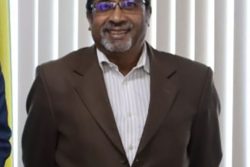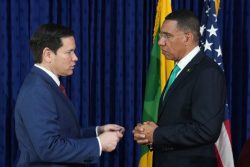NEW YORK/CARACAS, (Reuters) – The United States imposed new sanctions on Venezuelan President Nicolas Maduro’s wife and several of his top allies yesterday as U.S. President Donald Trump urged members of the United Nations to support a “restoration of democracy” in the once-booming OPEC nation.
The measure sanctioned six officials in Maduro’s “inner circle,” including Vice President Delcy Rodriguez and Defence Minister Vladimir Padrino, and “blocked” a $20 million private jet identified as belonging to a front-man of a top official.
The move adds pressure to a government already widely criticized for economic collapse and undermining democracy. But it does not materially change Washington’s efforts to pressure Socialist Party stalwarts who have shown no willingness to hand over power or negotiate a transition.
“Today, socialism has bankrupted the oil-rich nation and driven its people into abject poverty,” Trump said in remarks to the United Nations General Assembly.
“We ask the nations gathered here to join us in calling for the restoration of democracy in Venezuela.”
Under Maduro, Venezuela has limited the powers of the opposition-run legislature, jailed opposition politicians and created a parallel congress with unlimited powers.
Inflation is running at 200,000 percent and basic foods and medicines, like rice or antibiotics, are increasingly difficult to obtain. That has fueled an exodus of Venezuelans to nearby Latin American countries, where borders are now overwhelmed by Venezuelan migrants.
Maduro says he is victim of an “economic war” led by U.S.-backed adversaries. He denies limiting political freedoms, insisting opposition leaders have plotted assassination attempts and sought to overthrow him through violent street protests.
Yesterday, he said Trump’s comments were an apology for America’s history of colonialism in the region and offered words of support for the sanctioned officials who joined him during an event broadcast over state television.
“I’m surrounded by sanctioned (officials),” he said. “Thank you, Donald Trump, for surrounding me with dignity.”
He nonetheless said he hoped to arrange a face-to-face meeting with Trump. The White House last year responded to a similar request by saying such a meeting would happen when the country returned to democracy.
The Trump administration has levied several rounds of sanctions against Maduro’s government since 2017.
Sanctions such as those published yesterday bar American citizens and companies from any dealings with the individuals in question, which blocks them from holding bank accounts or contracting services from U.S. firms.
“More personal sanctions can maybe deprive top Venezuelan officials from some ill-gotten gains but this will hardly destabilize the regime,” said Raul Gallegos, associate director of consultancy Control Risks.
A broader set of financial sanctions created last year bar American investors from acquiring newly issued debt, effectively locking the country out of credit markets and further fueling the country’s cash-flow problems.
A group of U.S. senators yesterday said they had introduced legislation seeking to address the crisis in Venezuela by, among other things, tightening sanctions and providing $40 million in humanitarian aid.
U.S. Vice President Mike Pence separately said yesterday the United States would provide an additional $48 million to “partners in the region” to confront the “humanitarian crisis” caused by the growing migration of Venezuelans.
The U.N. migration and refugees organizations said in a joint statement in August that 2.3 million Venezuelans are currently living abroad and more than 1.6 million have left since 2015. Venezuela does not release migration figures.
But Maduro in September said no more than 600,000 Venezuelans had migrated in the past two years, and that 90 percent of them want to return.
Maduro has hung to power in part because of continued support of members of the armed forces such as Padrino, 55, who was appointed defense minister in 2014.
The Treasury said that Padrino helped ensure the military’s loyalty to Maduro. In the past, it has accused high-ranking officers of corruption and undermining human rights.
First lady Cilia Flores, a lawyer and former attorney general who also ran the country’s legislature, frequently appears at public events with Maduro and is seen an important behind-the-scenes power broker.
Treasury also said a Gulfstream 200 private jet located in Florida had been identified as belonging to a front man of Socialist Party Vice President Diosdado Cabello, who the United States accuses of being involved in drug trafficking.
Reuters was unable to immediately obtain comment from Cabello, who denies the accusations.
Separately, several Latin American nations plan to present a complaint against Maduro’s government for alleged human rights abuses with the International Criminal Court (ICC) in The Hague, Peruvian Trade Minister Roger Valencia said in an interview.
The countries, which include Peru, Colombia, Paraguay, Uruguay and Argentina, hope to submit the complaint today and were seeking backing from more countries to put pressure on Maduro.









